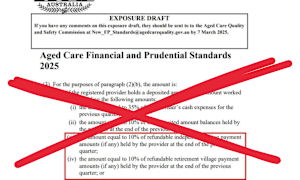Just 17 business days out from its long-awaited start, the Federal Government has delayed the new Aged Care Act – again. It’s the third time the legislation has been pushed back, and while the pause has been welcomed by peak bodies and providers, make no mistake: this delay comes at a cost.
We set up a LinkedIn poll yesterday that received responses from a large number of aged care executives – 32% gave the news the thumb's down as you can see from the results above.
As we reported yesterday (4 June), Health and Aged Care Minister Mark Butler and new Minister for Aged Care and Seniors, Sam Rae, announced in Adelaide that the Act’s commencement date will move from 1 July to 1 November 2025.
The decision follows last-minute advice from the Department and consultation with providers. And credit where it’s due – both Ministers deserve acknowledgment for listening and acting.
Their press release and the letter sent to providers (pictured) suggest that Government systems weren’t ready either. The delay is, in part, about buying time for both sides of the fence.
It’s a pragmatic move – and one that signals the Government is now taking a more collaborative approach with the sector.
For operators, the extra time should help stabilise plans and allow the Department to deliver the guidance providers desperately need to get their businesses compliance-ready. After months of uncertainty, that’s not nothing.
But the delay carries a sting.
Many providers, especially in home care, have already invested heavily in recruitment and transformation – building out allied health teams, shifting operations, and rolling out new systems to meet the demands of the incoming Support at Home program.
They now face four extra months of carrying these costs without the new funding model in place.
The delay will hit the Government’s bottom line too. Treasurer Jim Chalmers called it “modest” on Wednesday but confirmed it will cost around $900 million in lost revenue over the next four years, because wealthier older Australians won’t start paying more for non-clinical care until November.
Some operators have also lost staff along the way – burnt out from the pace of change or fed up with the sector’s stop-start rhythm. These aren’t just teething pains; they’re the very real impacts of reform without a stable foundation.
And then there’s the communication burden.
The Government’s two letters to home care clients last month cost an estimated $3 million. Who will foot the bill for explaining this latest delay to already confused consumers? Providers? Advocates? The sector once again finds itself in the awkward position of interpreting reform in real time.
Then there’s the human toll. Older Australians – the people this reform is meant to serve – have been waiting years for change. No surprise, then, that OPAN's “reluctant” support of the delay reflects more than just policy fatigue – it reflects a system that keeps missing its own deadlines.
So, what now?
Four years on from the Aged Care Royal Commission’s Final Report, we’re on our third attempt to “get it right.”
The new Aged Care Act – 30 years in the making – has been driven by bureaucrats, shaped by consultation, and heralded as a game-changer. But you have to ask: is the system broken, or was it simply never built to move fast?
Either way, it’s time for a new conversation – one that goes beyond deadlines and digital readiness.
We need a plan that transforms the way we age.
This week, we publish the 100th issue of our SATURDAY digital magazine. Our very first issue, back in March 2021, focused on the Royal Commission’s recommendations and the once-in-a-generation opportunity facing aged care.
Now, as the sector prepares for the coming wave of Baby Boomers, we think it’s time to think bigger. And we’re calling it Plan T – T for transformation.

In our special edition, out tomorrow, we hear from Amplar Health CEO Robert Read, Ageing Australia CEO Tom Symondson, Ian Yates, and other sector leaders who agree: the system doesn’t just need an update – it needs a rethink.
Get the big picture in the latest issue of SATURDAY – and don’t miss our special EOFY discount for new subscribers. Subscribe here.










